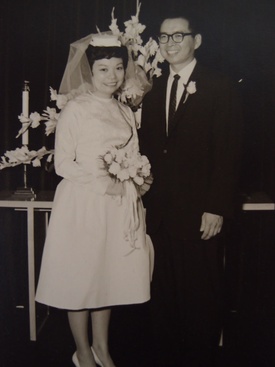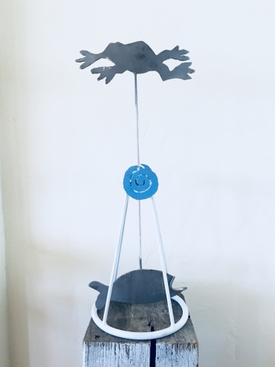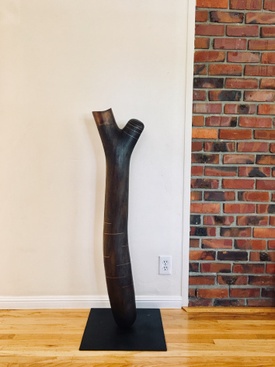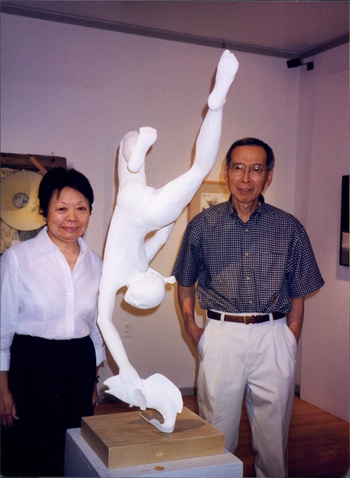And then you as an American, did you experience any backlash?
I remember there was an American soldier that was downed, an airplane was downed and naturally I ran with the whole mob of children that went to see them. And he was in a prison. I remember, and these bars were wooden, it was a local jail. And I felt so sorry for him. I remember running home ahead of the group with tears in my eyes because I felt so sorry for him, you know?
And you felt sorry because –
Every time I see an American soldier being shot, shot down, I think, “Oh he’s from Torrance.” Of course he’s probably not. America is so big, you know. But I always think, “Oh he’s from Torrance”.
There’s a little bit of sympathy.
Yeah.
I can imagine that being difficult as you grew up in California, but you’re Japanese and your parents are from Japan. I mean, did you feel conflicted about the war?
Not too much emotionally, I guess.

Yeah.
I just, I was twelve so I just went along with whatever my parents, you know, told me to do or – I would think that it would have been harder for my older sister, who was eight years older than me.
Oh wow. And how so?
Well because she already an adult. And I remember her going to Los Angeles to the designer school, you know, and all this kind of stuff. I was still in grammar school so.
So her life was kind of set or she had a lot of experiences where you grew up?
Especially she was very – she seemed sophisticated because everyday she would be going to Los Angeles.
The big city.
The big city from Torrance.
And, did your mom ever talk to you about anything during the war?
Not really, not really. I was sent to war factory from high school. And the airplanes, B-29s would fly over but, and we used to put our helmets on, our padded hoods. And then put a helmet over and then run out. But later on we just stayed in there sometimes because they would be flying way up high and they never dropped anything you know. Until ;later on the fighter jets came down.
Wow. Into your area?
I remember being strafed actually because I was in the factory. And so I guess they knew which ones to bomb you know. So I remember every time this siren would ring, and we reluctantly put our helmets on, our padded things and our helmets on and run into the forest. And at that time I really prayed to God. And then the dug out holes were filled with water and there were mosquitoes in there [laughs].
Oh my gosh. That’s really scary.
So we used to go into these shallow ones, that were half dug. And it’s not filled with water so we used to jump into those. And I remember praying at that time, to God. And then hanging onto these roots that comes down. I remember hanging on to these roots and thinking, “Oh dear God please tell me which side, which side of this hole I should I be on?” You know, this side or this side?
That must have been terrifying.
It was terrifying. I remember debris flying, you know, and there were people killed. Students killed. And I remember the teacher saying to us, “I can’t be responsible for you people so you can go home,” but he can’t buy tickets either, train tickets. And he doesn’t know which tunnels or which bridges are bombed. So he says, “It’s up to you, if you want to go home. I can’t be responsible for you.”
So I remember taking this big load of things that I owned, you know, you had to take your own futon. And I remember taking it to a family, I couldn’t carry it anymore. So I remember taking it to a farm and I said, “Could I deposit this here? I’ll come after it again.” And she says of course, she says, “Put it where the animals are.” So I remember leaving it there and we walked through tunnels. And it was pitch black. I mean, it was pitch black. And if you could see the end of the tunnel you can see a little tiny light, if it was curved, under you know, wherever it was, if it was curved you couldn’t just see. It was pitch black and I remember taking a stick and they said just walk along the tracks and keep going, you know.
Were you with other people, who were walking through?
There were other students.
So it got so bad that they eventually just told you –
The teacher said you could leave however you want. So a group of them marched together and walked home all the way.
Okay.
And I thought I’d be smart and went to the train station and they said they’re not selling any tickets but you can hop onto any train that you can. And we went as far as we could until the bridges were bombed or the tunnel was bombed, you know.
Oh my goodness.
So it took me a few days to get home.
Did your mother know that you were coming back or there was no way to tell her?
No, no. But I remember coming home and you know the Japanese homes are fenced in? So I remember going by there and saying, “Mama!”
You must have been so happy to be back.
Oh yeah.
I wonder what she thought was happening to you at the time, she must’ve known you were –
Well she thought I was still at the factory.
Right.
And then, not only that, but I had a brother in the Japanese army that went to Manchuria. And a brother in the U.S. army.
Oh no. And your brothers, were they both okay? They survived the war?
Oh yeah.
What other stories about trying to escape from the factory or trying to get home? Is there anything else that you remember about that?
Well I remember our factory was bombed. It was a Mitsubishi factory. I remember there was a small coffin and I said, “What is that?” And they said it’s a leg that they didn’t know who it belonged to or something like that. I remember being scared – we went to the service at night. And it was dark and I remember being scared at that time when I saw that little box [laughs].
Oh my gosh. And were some of your classmates killed in the bombing?
I can’t recall that I knew anybody was killed in our factory.
You must have grown up very fast.
I guess so. I didn’t realize it at the time because we’re all in the same boat.
Right. What do you remember about the war ending? Were you with your mother?
By then they needed English-speaking people. So the first thing made my older sister did, she flew to Kyoto and became a translator. And she said as soon as you graduate come to Kyoto because they need translators or interpreters or whatever. And so the day after I graduated from high school I flew to Kyoto. And I was a receptionist at a Red Cross billet, where all the American Red Cross nurses stayed.
So right away the day after I graduated high school, I took a train to Kyoto, Japan. And Kyoto was not bombed because of all the temples and shrines. And when I was in Tokyo, I mean it was shock, because it was just rubble, just miles and miles of rubble. But Kyoto they preserved somehow. And I don’t know why she chose Kyoto but that’s where she was.
So you worked there for how long?
Until I got my visa. I came to the United States.
So you knew that you wanted leave because you were a dual citizen?
At that time I had a dual citizenship. You had to give up one and I gave up my Japanese citizenship. I knew who won the war [laughs].
And was your mother going to stay in Japan?
She came much later.
Oh she did. How about your sister?
She came back. We each came back separately, I think I came back first. I got off the ship [in San Francisco]. I remember a reporter came on the ship and asked, “Do you have a place to stay?” And I said no. So he says ,“Well my uncle owns a hotel, so you can stay there if you want to.” And it was a dingy little hotel. We had to use a common bathroom and I had to lock the door. It was a Japanese-owned hotel. But I remember I didn’t know what was on the other side of the pull shades. I was scared. It was like a rooming house. I didn’t know what to do that night so I remember buying a bunch of comic books. I remember peeking out the window and it was another wall there.
And how old were you at this time, when you left Japan?
I must have been 18.
Oh okay.
Yeah. Something like that. Then I got a train to Chicago, because that’s where my brother was. And I was scared to death, I’ll tell you. And there was a sailor that occupied another seat across from me. And we didn’t say anything, he was scared too, because he was a young kid. Just joined the Navy or something. And finally when we got close to Chicago, he brought down a box of his stuff and he says, “Would you like a piece of candy?” And I said “Yes, thank you.” And I took this piece of candy, that’s all I had.
Oh, wow. That was the only thing you needed to say to each other, right. And then you met your brother in Chicago?
He was at the train station and I remember, they had a daughter, and I remember taking her and I let go thinking that she could stand up but she fell.
Oh no!
She says, “She can’t stand up yet!” [laughs] I had no idea of taking care of children, you know.
Yes. That’s an honest mistake. You saw so much by the time you weren’t even 20. So what happened in Chicago? Did you go to school?
I entered high school and then I went to summer school and I finished in one year and then I went to the Art Institute. I know that I always liked art. But my brother had a grocery store and so I stayed with he and his wife and I used to work Saturdays and Sundays at his little grocery store. It was across from the coliseum in Chicago.
So you were always interested in art? What kind of art did you enjoy or like?
Oh any kind of art. I liked, I always liked to draw and paint and things like that.
And so you knew that was what you wanted to study?
I don’t know if I studied it, but I was always interested in it. I just loved art altogether. I remember in Japanese school, my paintings were always up there. But I lived in Chicago for a long time.
And that’s where you started your family? Did you get married in Chicago?
Yes.
OK. And how did you meet your husband?
You know the Japanese tend to get together and I think that’s where I met him. I said, “I know he’s gonna call me.” [laughs]
And he did.
And he did.
*This article was originally published on Tessaku on July 10, 2018.
© 2018 Emiko Tsuchida









